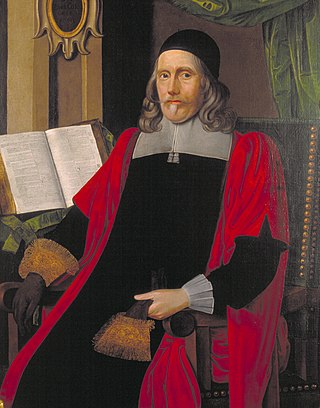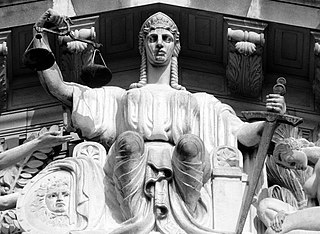Related Research Articles

Jurisprudence is the philosophy and theory of law. It is concerned primarily with both what law is and what it ought to be. That includes questions of how persons and social relations are understood in legal terms, and of the values in and of law. Work that is counted as jurisprudence is mostly philosophical, but it includes work that also belongs to other disciplines, such as sociology, history, politics and economics.
A brocard is a legal maxim in Latin that is, in a strict sense, derived from traditional legal authorities, even from ancient Rome.

Praetor, also pretor, was the title granted by the government of ancient Rome to a man acting in one of two official capacities: (i) the commander of an army, and (ii) as an elected magistratus (magistrate), assigned to discharge various duties. The functions of the magistracy, the praetura (praetorship), are described by the adjective itself: the praetoria potestas, the praetorium imperium, and the praetorium ius, the legal precedents established by the praetores (praetors). Praetorium, as a substantive, denoted the location from which the praetor exercised his authority, either the headquarters of his castra, the courthouse (tribunal) of his judiciary, or the city hall of his provincial governorship. The minimum age for holding the praetorship was 39 during the Roman Republic, but it was later changed to 30 in the early Empire.

Sir Edward Coke was an English barrister, judge, and politician. He is often considered the greatest jurist of the Elizabethan and Jacobean eras.

Audi alteram partem is a Latin phrase meaning "listen to the other side", or "let the other side be heard as well". It is the principle that no person should be judged without a fair hearing in which each party is given the opportunity to respond to the evidence against them.
Prejudice is a legal term with different meanings, which depend on whether it is used in criminal, civil, or common law. In legal context, prejudice differs from the more common use of the word and so the term has specific technical meanings.
Recusal is the legal process by which a judge, juror, or other adjudicator steps aside from participating in a case due to potential bias, conflict of interest, or appearance of impropriety. This practice is fundamental to ensuring fairness and impartiality in legal proceedings, preserving the integrity of the judiciary, and maintaining public confidence in the legal system. Historical and modern legal frameworks outline specific grounds for recusal, such as personal or financial conflicts of interest, prior involvement in a case, or demonstrated bias. Applicable statutes or canons of ethics may provide standards for recusal in a given proceeding or matter. Providing that the judge or decision-maker must be free from disabling conflicts of interest makes the fairness of the proceedings less likely to be questioned, and more likely that there is due process.

Thomas Bonham v College of Physicians, commonly known as Dr. Bonham's Case or simply Bonham's Case, was a case decided in 1610 by the Court of Common Pleas in England, under Sir Edward Coke, the court's Chief Justice, in which it was ruled that Dr. Bonham had been wrongfully imprisoned by the College of Physicians for practising medicine without a licence. Dr. Bonham's attorneys had argued that imprisonment was reserved for malpractice not illicit practice, with Coke agreeing in the majority opinion.
Ex turpi causa non oritur actio is a legal doctrine which states that a plaintiff will be unable to pursue legal relief and damages if it arises in connection with their own tortious act. The corresponding Ex turpe causa non oritur damnum, "From a dishonourable cause, no damage arises" is a similar construction. Particularly relevant in the law of contract, tort and trusts, ex turpi causa is also known as the illegality defence, since a defendant may plead that even though, for instance, he broke a contract, conducted himself negligently or broke an equitable duty, nevertheless a claimant by reason of his own illegality cannot sue. The UK Supreme Court provided a thorough reconsideration of the doctrine in 2016 in Patel v Mirza.
The "rights of Englishmen" are the traditional rights of English subjects and later English-speaking subjects of the British Crown.

Cornelius Adrian Comstock Vermeule is an American legal scholar who is currently the Ralph S. Tyler Professor of Constitutional Law at Harvard Law School. He is an expert on constitutional and administrative law, and, since 2016, has voiced support for Catholic integralism. He has articulated this into his theory of common-good constitutionalism.

Canadian administrative law is the body of law "that applies to all administrative decisions, whether issued by front-line officials, ministers, economic regulatory agencies, or administrative tribunals, with interpretations of law and exercises of discretion subject to the same. .. rules." Administrative law is concerned primarily with ensuring that administrative decision-makers remain within the boundaries of their authority and observe procedural fairness.

United Nations Security Council Resolution 138 was adopted on June 23, 1960, after a complaint that the transfer of Adolf Eichmann to Israel from Argentina constituted a violation of the latter's sovereignty. The Council declared that such acts, if repeated, could endanger international peace and security and requested that Israel make the appropriate reparation in accordance with the Charter of the United Nations and the rules of international law.

The Case of Proclamations [1610] EWHC KB J22 is an English constitutional law case during the reign of King James I (1603–1625) which defined some limitations on the royal prerogative at that time. Principally, it established that the monarch could make laws only through Parliament. The judgment began to set out the principle in English law that when a case involving an alleged exercise of prerogative power came before the courts, the courts could determine:

The rule of law is a political ideal that all citizens and institutions within a country, state, or community are accountable to the same laws, including lawmakers and leaders. It is sometimes stated simply as "no one is above the law". The term rule of law is closely related to constitutionalism as well as Rechtsstaat. It refers to a political situation, not to any specific legal rule. The rule of law is defined in the Encyclopædia Britannica as "the mechanism, process, institution, practice, or norm that supports the equality of all citizens before the law, secures a nonarbitrary form of government, and more generally prevents the arbitrary use of power."

Bias is one of the grounds of judicial review in Singapore administrative law which a person can rely upon to challenge the judgment of a court or tribunal, or a public authority's action or decision. There are three forms of bias, namely, actual, imputed and apparent bias.

Judicial interpretation is the way in which the judiciary construes the law, particularly constitutional documents, legislation and frequently used vocabulary. This is an important issue in some common law jurisdictions such as the United States, Australia and Canada, because the supreme courts of those nations can overturn laws made by their legislatures via a process called judicial review.

Ridge v Baldwin [1964] AC 40 was a UK labour law case heard by the House of Lords. The decision extended the doctrine of natural justice into the realm of administrative decision making. As a result, the case has been described as "the landmark case" that opened up decisions taken by the UK executive to judicial review in English law.

Calvin's Case (1608), 77 ER 377, (1608) Co Rep 1a, also known as the Case of the Postnati, was a 1608 English legal decision establishing that a child born in Scotland, after the Union of the Crowns under King James VI and I in 1603, was considered under the common law to be an English subject and entitled to the benefits of English law. Calvin's Case was eventually adopted by courts in the United States, and the case played an important role in shaping the American rule of birthright citizenship via jus soli.

Common good constitutionalism is a legal theory formulated by Harvard law professor Adrian Vermeule that asserts that "the central aim of the constitutional order is to promote good rule, not to 'protect liberty' as an end in itself". Vermeule describes it as an attempt to revive and develop the classical legal tradition by understanding enacted law as a positive application of background natural law principles. Within this tradition, he claims law is defined as "an ordinance of reason promulgated by political authorities for the common good." Vermeule states that law in this sense is "not tethered to particular written instruments of civil law or the will of the legislators who created them" but instead embody rational determinations of the common good, and it is those determinations, as well as the natural law background against which they are made, which constitute the law. Vermeule says that these principles include "a candid willingness to "legislate morality."
References
- 1 2 Vermeule 2012, p. 386.
- ↑ R v Sussex Justices, ex parte McCarthy , [1924] 1 KB 256, [1923] All ER 233
- ↑ Datar, Arvind (18 April 2020). "The origins of "Justice must be seen to be done"". Bar and Bench - Indian Legal news. Retrieved 11 September 2023.
- 1 2 3 Yale 1974, p. 80.
- ↑ Malysz 2007, p. 364.
- ↑ Zwingli, Ulrich (1544) [1527]. Operum: Ea, Quae In Genesim, Exodum, Esaiam & Ieremiam prophetas, partim ex ore illius excepta, partim ab illo conscripta sunt, una cum Psalterio Latinitate donato, co[n]tinens. Tomus Tertius (in Latin). Froschauer. p. 91. Retrieved 10 September 2023.
- ↑ Lee, Daniel (2021). "The Right of Sovereignty". The Right of Sovereignty: Jean Bodin on the Sovereign State and the Law of Nations. Oxford University Press. p. 89. doi:10.1093/oso/9780198755531.003.0003. ISBN 978-0-19-875553-1.
- 1 2 Yale 1974, p. 83.
- ↑ Gedicks 2009, p. 603.
- ↑ "Dr. Bonham's Case | Natural Law, Natural Rights, and American Constitutionalism". www.nlnrac.org. Retrieved 10 September 2023.